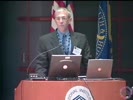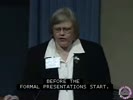| Description: |
This talk is a departure from virtually any I have ever given because I will cover questions of scientific direction and organization, as well as more familiar biological questions with accompanying data-driven answers. The organizational question is one I am often asked. What is systems biology and why should anyone be excited by it? Those old enough might remember that a similar question was asked sarcastically by biochemists about molecular biology 40 years ago. It is now the early days for systems biology, as it was the early days for molecular biology, and I am reminded of a metaphor concerning a reptile 250 million years ago and its consternation, if it suddenly confronted its first example of a mammal-like animal that had just split off from it. The reptile, naturally proud of its fruitful lineage, might justifiably wonder what was so special about its mammal-like cousin, which at that time was distinguished only by a slightly remodeled jaw. It could not have imagined the future of a mighty line of sweaty, hairy, lactating, animals, each with an exaggerated neocortex. The future lay so far ahead. In my introduction, I will try to give a glimpse further into the future of the methodologies and the questions that may differentiate systems biology from other pursuits. However, this will probably only serve to reinforce systems biology's roots in cell biology, evolutionary biology, physiology, and biochemistry. There are three scientific questions I will use to personally document my cautious entree into this developing field. Though my lab is still rooted in cell biology, interest in quantitative measurement and modeling has begun to infiltrate almost everything we do. You can judge for yourself whether this interest has led us down the garden path or given us direct passage to the Emerald Kingdom.
Marc W. Kirschner, Ph.D. is founding chair of the Department of Systems Biology at Harvard Medical School. He and John Gerhart are co-authors of Cells, Embryos, and Evolution (Blackwell, 1997) and their second book, The Plausibility of Life: Resolving Darwin's Dilemma (Yale University Press, 2005).
Dr. Kirschner was elected Foreign Member of the Royal Society of London and as a Foreign Member of the Academia Europaea in 1999. He was the 2001 recipient of the William C. Rose Award, presented by the American Society for Biochemistry and Molecular Biology. Later that year, he received a 2001 International Award by the Gairdner Foundation of Toronto. He was awarded the Rabbi Shai Shacknai Lectureship Prize for 2003 at the Lautenberg Center for General and Tumor Immunology at The Hebrew University in Jerusalem. In December 2003, Kirschner received the E.B. Wilson Medal, the American Society of Cell Biology's highest scientific honor named for an early 20th century pioneer of American biology who advocated the chromosomal theory of inheritance, is awarded by scientific peers to those who have made significant and far-reaching contributions to cell biology over the course of a career. He received the Dickson Prize for Science from Carnegie Mellon University for his outstanding contributions to science in 2004. He is a member of the National Academy of Sciences and the American Academy of Arts and Sciences, and has served on the Advisory Committee to the Director of the National Institutes of Health and as President of the American Society for Cell Biology. Dr. Kirschner's laboratory investigates three broad, diverse areas: regulation of the cell cycle, the role of cytoskeleton in cell morphogenesis, and mechanisms of establishing the basic vertebrate body plan.
For more information, visit
http://sysbio.med.harvard.edu/faculty/kirschner
NIH Director's Wednesday Afternoon Lecture Series
|










